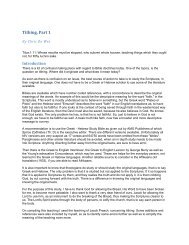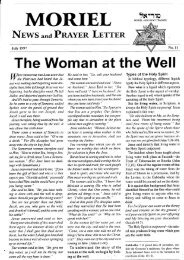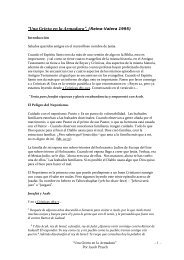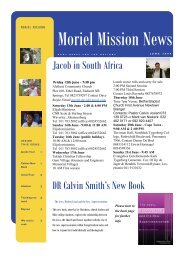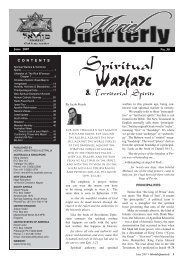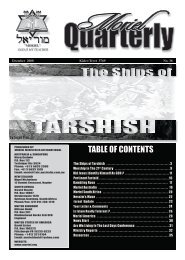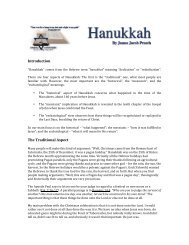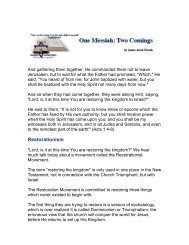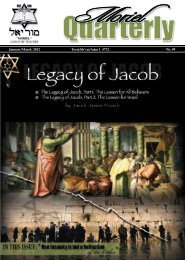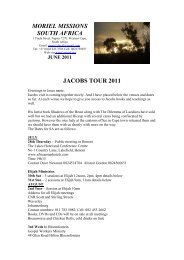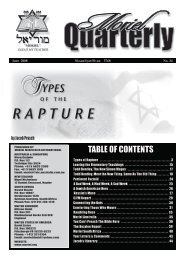The Wedding Feast (~19.49) - Moriel Ministries
The Wedding Feast (~19.49) - Moriel Ministries
The Wedding Feast (~19.49) - Moriel Ministries
You also want an ePaper? Increase the reach of your titles
YUMPU automatically turns print PDFs into web optimized ePapers that Google loves.
Hebrew Lesson<br />
<strong>The</strong> water of life is the Word from God<br />
HEBREW LESSON . . .<br />
FAQ: Why Didn’t the Jews Resist?<br />
Resist not Evil<br />
In the realm of human nature, the most natural response<br />
when one is threatened or attacked, or even put in danger,<br />
is what scientists refer to as “fight or flight”: either to defend<br />
oneself against the danger, or to flee from it. One of<br />
the most frequently pondered questions about the Shoah,<br />
is why did the Jews not fight back more against the Nazis to<br />
prevent their people from Genocide and the gas chambers.<br />
It seems only natural, that a people who existed all over Europe,<br />
close to 12 million at the beginning of World War II,<br />
with 3.5 million in Poland alone, should pick up arms against<br />
a tyrant seeking to destroy them and take control of Europe.<br />
Some have counted the Jews as “lambs to the slaughter” and<br />
expressed wonder at the idea that millions walked what is<br />
perceived as blindly to their death. After all some reason,<br />
in mass executions, did the Jews in line to be killed not realize<br />
that the others were being killed, and were not more of<br />
them than even the battalions? <strong>The</strong> nature of resistance in<br />
wartime though is not well understood by many, and the<br />
nature of resistance in genocide is even less understood.<br />
One thing is clear in considering the choice to resist or<br />
not, that morality and wisdom in wartime in general becomes<br />
very complex, with threatening consequences. It is<br />
this complexity of choice that will be considered here.<br />
A Darkening Horizon<br />
<strong>The</strong> choice for the Jewish People and others to resist or<br />
not resist the Nazis began as soon as the Nazis started to<br />
come to power. In 1923, the Nazis had growing support<br />
but they were still a very small minority Party, and would<br />
gain only about 3% of the vote. Still, even at this point with<br />
the perception of the Nazis as a fringe group and the disdain<br />
for brutal tactics and censorships by the ‘brownshirts’,<br />
many German Jews were outspoken, but there was only occasional<br />
resistance, because neither the Jews nor Domestic<br />
Germans felt that the National Socialists would come to hold<br />
the monolithic power which would come about in 10 years.<br />
Anti-Jewish demonstrations and rhetoric were decried by<br />
some and supported by others, not unlike such occurrences<br />
today in Europe and the United States.<br />
Anti-semitism in the 1920s and 1930s in Germany,<br />
though was not limited to the Nazis: many old prejudices held<br />
strong, and the Jews, who had remained a people through<br />
dispersion for centuries, had learned the value of passive<br />
co-existence to the extent possible, combined up until this<br />
time period with a segregation lasting far beyond the Jewish<br />
Enlightenment which gave rise to possibilities of Modern<br />
20th century assimilation of the Jews into Western cultures.<br />
<strong>The</strong> Morality of Resistance vs<br />
Non-resistance<br />
To discuss the morality of whether to resist or not resist<br />
in war time is to move out of the normal range of ethics: in<br />
war in general, a person is in constant danger, but so are<br />
others; in war quick life and death decisions must often be<br />
made without time to consider outcome or moral implications.<br />
Jewish resistance was compounded in these choices<br />
in which there were not right or wrong decisions but wrong<br />
or less wrong decisions. An example of this would be, Jews<br />
who had a small cache of arms in the ghettos, who at best<br />
could have killed a small group of Nazis out of thousands.<br />
Should they resist? If they picked up weapons and fired, the<br />
result would most likely be the rapid random killing of themselves<br />
and innocent bystanders, or even a razing or bombing<br />
of the ghetto. If they did not resist they would most certainly<br />
been enslaved, deported, robbed and murdered. Resistance<br />
in many cases became more of a statement than a realistic<br />
defense. Medical staff in the ghetto or Jewish hospitals faced<br />
the same kinds of choices: in one case during the time of deportation,<br />
staff at a children’s hospital were asked to ready<br />
their patients because the Nazis would arrive shortly. Knowing<br />
the Nazi’s penchant for killing the weak and ill, some<br />
staff members gave their patients large doses of morphine or<br />
other narcotics: they knew the patient would probably die.<br />
Resistance and Consequences<br />
A premiere example of the dilemma of Jewish Resistance<br />
during the Shoah lies in the events surrounding and leading<br />
to the ‘Warsaw Ghetto Uprising’. Unlike regular warfare,<br />
where assaults are met by resistance with calculated risk, the<br />
Ghetto provides a unique look at a classic moral dilemma.<br />
Long before the uprising, ZOB knew about the consequences<br />
of the deportations. <strong>The</strong> youth, more willing to rebel initially<br />
tried to work within the bounds afforded them – they<br />
warned the Judenrat. <strong>The</strong> youth and the Judenrat however<br />
were greatly constrained by moral and political boundaries.<br />
If the Judenrat lived up to their conscience, then their defiance<br />
of the Nazi liaisons would have brought instant imprisonment<br />
and death. For the younger dissidents, though,<br />
the dilemma constantly and throughout the war, was that of<br />
minor resistance endeavors succeeding, vs the great and real<br />
possibility that the action would bring about retribution and<br />
death not only to them but to many people. <strong>The</strong> fear was<br />
well-grounded: by the time of the Uprising, there had been<br />
constant reprisals and even legislation enacted which made<br />
Jewish resistance an extremely difficult potential.<br />
NOTES: http://www.shoaheducation.com/faqjewsresist.html<br />
© 1997,2003Elizabeth K. Best, PhD; Shoah Education Project (Web)<br />
December 2009 • <strong>Moriel</strong> Quarterly 23




